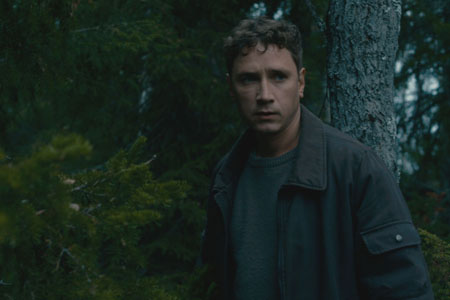I can’t wait to at least jot down a few impressions of Thomas Arslan’s Gold, one of the films I’ve most looked forward to here at the Berlinale, and Joshua Oppenheimer’s The Act of Killing, which has just knocked me on my ass. But the day is done, and tomorrow starts early.
And so, for now, just a few notes on Boris Khlebnikov’s A Long and Happy Life, a short and unhappy film. A river runs through a village on the Kola Peninsula, tucked up in the northwest of the country, next door to Finland and Norway. In an otherwise bare office, little desktop Russian flags are foregrounded as administrators lay out the simple terms of a deal that all parties understand is not to be refused. Sascha (Alexander Yatsenko, making the most of his simpatico yet impenetrable face) is to sell his farm to developers who aim to attract tourists to this undeniably gorgeous landscape. How Sascha deals with the people who work for him is his own business, but he will be generously compensated. Sascha agrees and delivers his announcement to the workers—who promptly stage what Sascha will refer to as a “mini-revolution.” One voice of protest eggs on another, and within minutes, they’re pledging to take up arms to defend the only livelihood they know, pulling up potatoes. It’s futile, it’s insane, and one of the workers’ spokesman will eventually admit as much: “We were morons.” But Sascha has already flipped over to their cause and, one by one, they abandon him.
Long story short, Khlebnikov has made a short story long. Even at only 77 minutes, the film is riddled with passages that feel like padding. Nonetheless, A Long and Happy Life remains a solid little number with a half-surprise ending made all the more effective by resisting any temptation to go sensational.
More from Stephen Dalton (Hollywood Reporter), Leslie Felperin (Variety), and Jonathan Romney (Screen). At the Film Society of Lincoln Center, Brian Brooks has notes from the press conference.
Updates, 2/13: Stephen Garrett for Time Out New York: “Really more of a cinematic short story than a richly textured tragedy, Khlebnikov still nimbly touches on a wealth of ideas: socialist idealism, capitalistic pragmatism, government corruption, and the ultimate trump cards of human impulse—self-interest, cowardice, pride, and wrath.”
“A lot could have been made out of the death of idealism, a theme more than pertinent to Russia’s current sociopolitical situation,” finds Giovanni Marchini Camia, writing for Film Comment. “However, as soon as the betrayals start, the unambitious script contents itself with depicting the flight of each of the workers and resorts to a wholly overblown climax to neatly wrap up the story in a mere 77 minutes.”
For news and tips throughout the day every day, follow @KeyframeDaily on Twitter and/or the RSS feed. Get Keyframe Daily in your inbox by signing in at fandor.com/daily.




